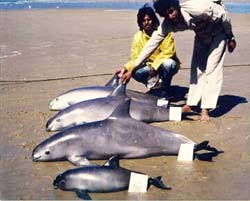World’s leading scientists issue unprecedented plan for protecting ocean and marine life

Vaquita (Phocoena sinus). The world’s smallest porpoise, the vaquita has a gray back fading to a white belly, with black eye rings and dark patches surrounding its lips. This critically endangered species is restricted to the upper Gulf of California and is very rarely seen. <br>Credit: Conservation International/Aleja <br>© Conservation International/Alejandro Robles <br>
Defying ocean’s end offers global perspective on eve of pew report
For the first time ever, the world’s largest environmental organizations, working with scientists, the business community and international governments, met specifically to develop a comprehensive and achievable agenda to reverse the decline in health of the world’s ocean.
The five-day Defying Ocean’s End (DOE) conference marked the launch of a new, science-based international effort to restore and maintain the health of marine systems. The gathering resulted in several preliminary recommendations:
- Promote a World Ocean Public Trust: 60 percent of the world’s ocean falls in international waters, outside any country’s jurisdiction. International waters, largely open to uncontrolled exploitation, must be proactively managed. This marks a major reversal in thinking in ocean policy, since the ocean has for centuries been available for open access and exploitation.
- Expand the Global System of Marine Parks: A vital component of ocean management includes formal protection for critical areas to restore and maintain ocean health. Less than one percent of the world’s ocean currently enjoys full protection. Seamounts, or mountains that rise from the ocean floor, are areas that offer refuge for a high percentage of marine life. They are of particular concern, since they primarily fall in unregulated international waters.
- Assess Global Priorities: The conservation status of countless marine species and the health of many marine systems is unknown. A massive effort, to begin immediately, is required to even more accurately assess conservation priorities in the ocean, particularly those marine species most vulnerable to extinction.
- Create an Ocean Ethic: An urgent global communication and education campaign is needed to shatter myths about the ocean’s limitless ability to withstand human neglect and abuse.
“The health of humankind is directly related to the health of the ocean – and the ocean and the marine life that calls it home is in real trouble,” said Sylvia Earle, Executive Director of Conservation International’s Global Marine Program and DOE co-convener. “We couldn’t afford yet another meeting where we just sat around and created a wish list, so we formed Defying Ocean’s End to take unprecedented and bold steps forward.”
To ensure the agenda from Defying Ocean’s End becomes reality, an anonymous donor today provided Conservation International, the coordinating organization of the DOE conference, a $5 million, five-year grant. The grant requires $4 million in matching funds, to bring the total to $9 million of funding.
The world’s ocean and the marine life it harbors are collapsing. A major study in Nature last month reported that fully 90 percent of large, predatory fish populations, including tuna and marlin, have disappeared, mostly due to over-fishing and destructive fishing methods. Other threats, such as coastal development, pollution and climate change, are also devastating marine life.
“It’s stunning to consider that in the past few decades, we have done away with the vast majority of large fish in the ocean and significantly altered the way marine systems operate,” said Intel founder Gordon Moore, co-convener of the DOE conference. “By using sound science and implementing an achievable action plan, we still have a small window of opportunity to reverse these trends.”
On Wednesday, the Pew Oceans Commission will release its long-awaited report, offering specific recommendations for the United States. Commission member Julie Packard presented the results to the DOE participants earlier today, who overwhelmingly supported the recommendations. Many top international priorities identified by DOE participants reinforce the recommendations issued by Pew.
“The world’s ocean is the last living frontier on Earth. Its diversity and productivity exceed that of any on land, but has barely been explored,” said Graeme Kelleher, DOE conference chair. “We have an opportunity and obligation now to protect the ocean for the future welfare of humans, other animals, and marine plants. This conference was a major step toward defying ocean’s end. Prevention now is better than scrambling for a cure later.”
The Defying Ocean’s End conference was convened to help reverse the decline in health of the world’s ocean. Leaders from Conservation International, Environmental Defense, International Seakeepers Society, IUCN-World Conservation Union, Natural Resource Defense Council, Ocean Futures Society, Seaweb, The Nature Conservancy, The Ocean Conservancy, Wildaid, Wildlife Conservation Society, World Resources Institute and World Wildlife Fund attended among others, as did representatives from government, industry and academia. In total, more than 100 marine experts from 20 countries participated. The conference was convened by Sylvia Earle and Gordon Moore and was supported by The Gordon and Betty Moore Foundation.
Media Contact
All latest news from the category: Ecology, The Environment and Conservation
This complex theme deals primarily with interactions between organisms and the environmental factors that impact them, but to a greater extent between individual inanimate environmental factors.
innovations-report offers informative reports and articles on topics such as climate protection, landscape conservation, ecological systems, wildlife and nature parks and ecosystem efficiency and balance.
Newest articles

Innovative 3D printed scaffolds offer new hope for bone healing
Researchers at the Institute for Bioengineering of Catalonia have developed novel 3D printed PLA-CaP scaffolds that promote blood vessel formation, ensuring better healing and regeneration of bone tissue. Bone is…

The surprising role of gut infection in Alzheimer’s disease
ASU- and Banner Alzheimer’s Institute-led study implicates link between a common virus and the disease, which travels from the gut to the brain and may be a target for antiviral…

Molecular gardening: New enzymes discovered for protein modification pruning
How deubiquitinases USP53 and USP54 cleave long polyubiquitin chains and how the former is linked to liver disease in children. Deubiquitinases (DUBs) are enzymes used by cells to trim protein…



